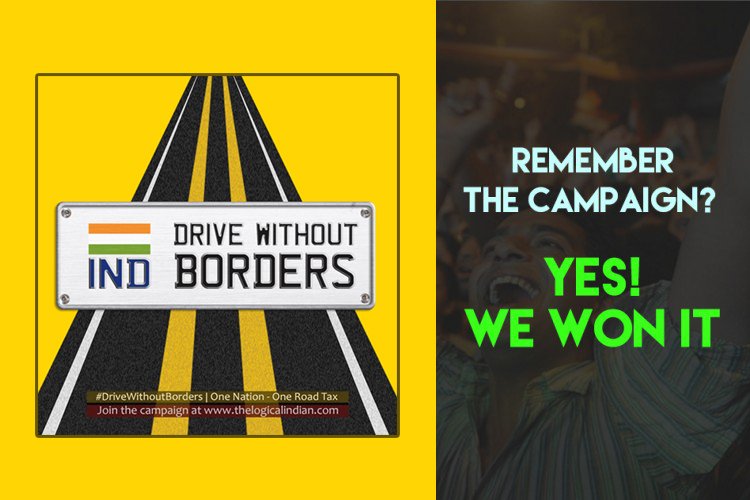
1 Year Ago: ‘Drive Without Borders’ Defeated Karnataka Law That Imposed Lifetime Tax On Out-Of-State Vehicles
11 March 2017 5:36 AM GMT
One year ago on 10th March, the Karnataka High Court declared the law that forced owners of vehicles registered outside Karnataka to pay lifetime tax in the State when the vehicle is used in Karnataka beyond 30 days as unconstitutional.
According to the Central Motor Vehicles Act, owners of vehicles registered in one state are supposed to pay a lifetime tax when they shift to a state that is not their domicile. The Court quashed the demand notices issued by the RTOs to several owners of out-of-Karnataka vehicles after seizing their vehicles, asking them to pay lifetime tax here.
The Logical Indian, together with Drive Without Borders headed by Waseem Memon, ran a month-long campaign against the draconian law of the Karnataka government. The law forced the vehicle with non-KA no. to pay road tax of lifetime within 30 days of entering into Karnataka.
This wouldn’t have been possible without the efforts of our community members who participated in the campaign by signing the petition and spreading the word with their likes, shares and tweets. As we always say, you can make a difference right from sitting at your home. Your each like, tweet and share matters. Social media can do wonders if used properly and The Logical Indian community is an effort towards it.
The man behind the movement: Waseem Memon
Everyday Indians who transform into dedicated leaders of mass movements instigate change in society and inspire us all.

Waseem Memon is one such leader. Mr Memon’s profession involved extensive travelling. It was a transferable job so he had to shift homes continuously around the country. Hubli, Hyderabad, Delhi, back to Hyderabad, then Bengaluru – he was regularly on the move.
It was this constant travelling that brought Mr Memon face-to-face with India’s strange road tax laws.
What was the problem?
Here’s an analogy: suppose you’re a resident of Delhi and your job entails you to shift to Bengaluru. You do so with your vehicle. Now, you would’ve paid a lifetime road tax of 15 years for the license to drive your vehicle. But here’s the problem: THAT TAX IS VALID ONLY IN YOUR HOME STATE. This means that when you shift to Bengaluru you are required to pay the lifetime road tax for 15 years AGAIN to be permitted to drive in state of Karnataka. The tax rates vary from 6% to 20%, depending on your vehicle and the state you’re moving into.
Waseem Memon had to frequently travel from state to state. In every new state, he went to he bought a new car with the registration number of that state, selling his old one. This was highly frustrating. But more than frustrating, it was unfair, Mr Memon reasoned – why should an Indian citizen pay different taxes for different states of the same country? One nation, one constitution, one people – then why not one tax?
Mr Memon immediately went into action. He began a Facebook-centred initiative named ‘Drive Without Borders’, wrote to the Ministry of Road Transport & Highways, used social media to spread the message, quit his job so he could dedicate more time to the task, filed PILs, campaigned extensively and motivated many others to join the movement. To get the government involved Mr Memon circulated a petition to be submitted to Nitin Gadkari. It received over 55,000 signatures. He began on July 2014 with 3 friends; today he is the leader of a 50,000-srtong grassroots movement.
Mr Memon filed a petition in the Karnataka High Court against a road taxation amendment; he has filed a similar petition in the Hyderabad High Court. “These state amendments are against the freedom of movement which our constitution guarantees and are also against the spirit of the constitution’s provisions and federal principles,” he said.
Mr Memon’s movement made waves across the country, resonating with thousands of commuters who faced similar problems. Freedom of movement between states preserves time, saves money, and enhances inter-state trade. What Drive Without Borders demanded was something logical: an Indian must be able to travel around his/her motherland without suffering from tax policies that make it seem as if he’s travelling around the world.
Also Read: Have You Joined The ‘Drive Without Borders’ Movement?
 All section
All section













